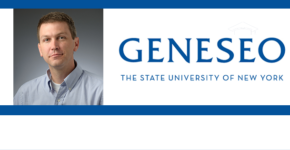Category: Biology
-

Jonathan Wilson, Haverford College – Re-Animating Extinct Plants
Planetary history can hold keys to preserving species when the climate changes. Jonathan Wilson, assistant professor of biology and environmental studies at Haverford College, examines how plant fossils can help current plants survive for generations. I received my B.A. in Computer Science and Earth and Planetary Sciences from Johns Hopkins University in 2003 and a…
-

Travis Bailey, SUNY Geneseo – Conquering Vision Loss through Regenerative Biology
Zebrafish could hold clues to helping us repair our eyesight. Travis Bailey, assistant professor of biology at SUNY Geneseo, examines how zebrafish repair their eyes and what we can learn to benefit ourselves in the future. Biologist Travis Bailey gained an interest in regenerative biology as an undergraduate student and forged his pathway into the…
-

Adina Roskies, Dartmouth College – Deep Brain Stimulation Affects Personality
Is your consciousness just neural functioning like the rest of your body? Adina Roskies, Helman Family Distinguished Professor; Professor of Philosophy; Chair, Cognitive Science at Dartmouth College, delves into this question. Adina Roskies is the Helman Family Distinguished Professor, Professor of Philosophy and chair of the Cognitive Science Program at Dartmouth College. She is also affiliated…
-

Jonathan Kelber, California State University, Northridge – Pancreatic Cancer
Pancreatic cancer is a dire diagnosis. Jonathan Kelber, associate professor of biology at California State University Northridge, discusses a new effort to fight back against the disease. I teach undergraduate and graduate courses on cell/molecular biology and cancer. My research focuses on understanding the mechanisms by which cancers begin and then later acquire the ability…
-

Aaron Krochmal, Washington College – Animal Learning, Memory and Migration
Animals migrate over long distances – but how do they know where to go? Aaron Krochmal, associate professor of biology at Washington College, discusses this question. Aaron R. Krochmal, an Associate Professor of Biology at Washington College, is an integrative organismal biologist interested in the behavior, physiology, and ecology of reptiles. Specifically, he combines these…
-

Trina Rytwinski, Carleton University – Evidence Based Management
What’s the best way to conduct environmental management? Trina Rytwinski, post-doctoral fellow in biology at Carleton University, looks into this question. My research focuses on understanding the circumstances in which roads and traffic affect wildlife populations. I am particularly interested in looking at species traits and their behavioral responses to roads, to determine which species…
-

Megan Dobro, Hampshire College – Bacteria
Bacteria is everywhere, but how much do we know about it? Megan Dobro, assistant professor of human biology at Hampshire College, explores how we’re learning more about these tiny machines. Megan Dobro, assistant professor of human biology, received her B.S. from Bridgewater State University and her Ph.D. in molecular biology from the California Institute of…
-

Brian Beatty, New York Institute of Technology – Heart Disease
Finding an easier way to detect heart disease could be closer than you think. Brian Beatty, Associate Professor of Anatomy at the New York Institute of Technology College of Osteopathic Medicine, looks into a surprising part of the body that could hold clues to your heart health. Brian Beatty, Ph.D., specializes in evolutionary biology, paleontology,…
-

Noelle Nelson, University of Kansas – Working Memory and Satiation
Some of us can get tired of a song quickly, while others listen over and over again. Noelle Nelson, assistant professor of marketing and consumer behavior, at the University Of Kansas School Of Business, examines whether working memory can help decide whether we get tired of something in a hurry, or not at all. Noelle…
-

Colin Camerer, California Institute of Technology – Testosterone
Does testosterone increase mental mistakes? Colin Camerer, professor of behavioral economics at the California University of Technology, examines this question. Colin Camerer is a pioneer in behavioral economics and in neuroeconomics. He is interested in how psychological forces and their deeper neuroscientific foundations influence economic decisions involving individuals and markets. In his research, he uses…
